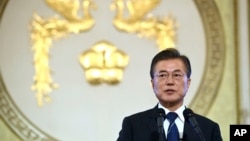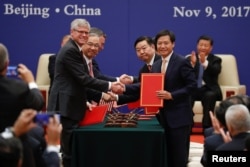South Korea is vying with China to help develop the Philippines, as the aid recipient’s president crafts a multi-country foreign policy with no clear favorite.
South Korean President Moon Jae-in told counterparts from the Philippines, as well as nine other Southeast Asian countries at regional summits last week, that Seoul was “the best partner to share the experience” of economic growth. South Korea, he said, can aid the others in high-tech, railways, clean energy and water management.
The Philippines stands near the front of the line for that assistance, analysts say. China pledged $24 billion in aid in October 2016 and last week signed 14 economic cooperation agreements, including one covering railways. Japan's prime minister announced $8.8 billion in economic support last month.
South Korea wants to keep up, especially with China, to ensure the Philippines stays in a U.S.-led alliance of Asia-Pacific countries, said Herman Kraft, political scientist at University of the Philippines Diliman. Washington, Seoul, Tokyo and Manila traditionally work together checking the expansion of China, a former Cold War rival.
“I think one of the things that Korea might actually be concerned about right now is of course, in a similar groove with Japan, they’d like to make sure that the Philippines doesn’t just turn around in terms of its relationship with the United States.” Kraft said.
Philippine President Rodrigo Duterte broke ice with China last year by setting aside a maritime sovereignty dispute that had divided them for four years. At the same time, he was threatening to stop U.S. support for his own relatively weak armed forces.
Money for infrastructure
This month South Korea offered $1.7 billion in credit and other financial aid to help the Philippines develop transportation and energy, Manila-based media outlets said. The South Korean Embassy in Manila could not be reached for comment.
Duterte has set out to spend $167 billion for building public infrastructure, a way of luring more foreign investment. Today Manila’s seaport is congested, power costs exceed regional averages and most of the country lacks railway connections.
Philippine National Economic and Development Authority data in 2013 placed South Korea as Manila’s seventh strongest development partner. Official development aid was worth $608.7 million.
Korean brand
South Korea may see aid to the Philippines and elsewhere in Southeast Asia as a way to elevate its national “brand,” as well, said Song Seng Wun, Southeast Asia-specialized economist with the private banking unit of CIMB in Singapore.
China’s offers could eventually smooth exports of Chinese-branded goods in the Philippines, competing with South Korea’s products, he said. South Korea’s signature appliances and consumer electronics stand to lose ground if Chinese goods gain. Consumption underpinned Philippine economic growth of 6.9 percent last year.
“It is really about protecting their brand name and not being overshadowed by the Chinese flag, which is really growing in size,” Song said.
China began a $900 billion “one belt, one road” strategy four years ago to help countries across Asia build up infrastructure as a way of smoothing trade.
The total value of trade between South Korea and the Philippines has risen from $10 billion in 2011 to $13.40 billion in 2014 on the back of increased economic cooperation, according to media reports and a business consultancy in Manila. It ranked as the Philippines’ No. 6 foreign direct investment source last year.
South Korean leaders probably hope to tap Southeast Asia to avoid over-dependence on China as an investment destination, Song added.
In the first half of the year, Chinese boycotted South Korean goods and cut back travel to Korea over a state-to-state disagreement over Seoul’s deployment of Terminal High Altitude Area Defense (THAAD) anti-missile system. Beijing worried the U.S.-designed system could monitor China as well as its official target, North Korea.
Clean reputation, sort of
South Korea has a clean name in the Philippines as the two sides lack historical baggage. But there are some areas of concern.
Duterte said in February that a South Korean “mafia” in the Philippine city Cebu was “into” prostitution, illegal drugs, and kidnapping, local media reported then.
“I wouldn’t say there’s a negative reaction at this time, but at least I’ve heard some Filipinos mentioning this in a way that it’s not normal anymore,” Kraft said.
Philippine officials probably welcome Korean aid as a chance to diversify economic support without showing favor to anyone, said Jonathan Ravelas, chief market strategist with Banco de Oro UniBank, Metro Manila.
“There’s no issues of concentration, whether it’s China or Japan, because these are the two key players, but having a South Korean funding then eliminates a potential bias,” Ravelas said.






